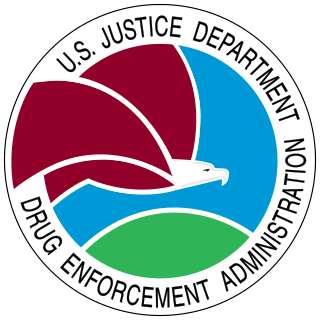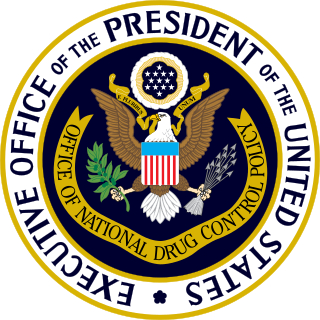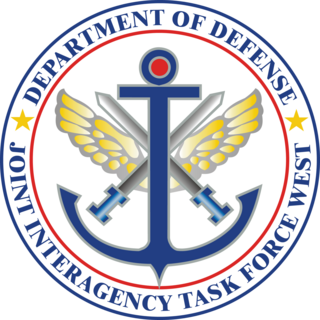Homeland security is an American national security term for "the national effort to ensure a homeland that is safe, secure, and resilient against terrorism and other hazards where American interests, aspirations, and ways of life can thrive" to the "national effort to prevent terrorist attacks within the United States, reduce the vulnerability of the U.S. to terrorism, and minimize the damage from attacks that do occur." According to an official work published by the Congressional Research Service in 2013, the "Homeland security" term's definition has varied over time.

The Drug Enforcement Administration (DEA) is a United States federal law enforcement agency under the U.S. Department of Justice tasked with combating illicit drug trafficking and distribution within the U.S. It is the lead agency for domestic enforcement of the Controlled Substances Act, sharing concurrent jurisdiction with the Federal Bureau of Investigation, the U.S. Immigration and Customs Enforcement, and U.S. Customs and Border Protection. However, the DEA has sole responsibility for coordinating and pursuing U.S. drug investigations both domestically and internationally.

Europol, officially the European Union Agency for Law Enforcement Cooperation, is the law enforcement agency of the European Union (EU). Established in 1998, it is based in The Hague, Netherlands, and serves as the central hub for coordinating criminal intelligence and supporting the EU's Member States in their efforts to combat various forms of serious and organized crime, as well as terrorism.

The Office of National Drug Control Policy (ONDCP) is a component of the Executive Office of the President of the United States.

The High Intensity Drug Trafficking Area (HIDTA) program is a drug-prohibition enforcement program run by the United States Office of National Drug Control Policy. It was established in 1990 after the Anti-Drug Abuse Act of 1988 was passed. The HIDTA program was made permanent through Title III of the Office of National Drug Control Policy Reauthorization Act of 2006.

Carlos Hank González, nicknamed El Profesor, was a Mexican politician and businessman. Originally a teacher, he was an entrepreneur who built political contacts along with businesses, leading to various government and political positions at the state and national level. He was prevented from seeking the presidency due to laws requiring both parents to be Mexicans by birth, whereas his father was German.

The Organized Crime Drug Enforcement Task Force (OCDETF) is a federal drug enforcement program in the United States, overseen by the Attorney General and the Department of Justice. The principal mission of the OCDETF program is to identify, disrupt, and dismantle the major drug trafficking operations and tackle related crimes, such as money laundering, tax and weapon violations, and violent crime, and prosecute those primarily responsible for the nation's drug supply.

Transnational organized crime (TOC) is organized crime coordinated across national borders, involving groups or markets of individuals working in more than one country to plan and execute illegal business ventures. In order to achieve their goals, these criminal groups use systematic violence and corruption. Common transnational organized crimes include conveying drugs, conveying arms, trafficking for sex, toxic waste disposal, materials theft and poaching.
HashKeeper is a database application of value primarily to those conducting forensic examinations of computers on a somewhat regular basis.
This article deals with activities of the U.S. Central Intelligence Agency related to transnational crime, including the illicit drug trade.
Project Gunrunner is a project of the U.S. Bureau of Alcohol, Tobacco, Firearms and Explosives (ATF) intended to stem the flow of firearms into Mexico, in an attempt to deprive the Mexican drug cartels of weapons.

Joint Interagency Task Force West is a standing United States military joint task force with the mission of combating drug-related transnational organized crime in the Indo-Asia-Pacific. JIATF West's area of responsibility (AOR) is that of United States Indo-Pacific Command (USINDOPACOM). JIATF West is one of two Joint Interagency Task Forces with a counter-narcotics mission. The other is Joint Interagency Task Force South. The task force is run as USINDOPACOM's "executive agent" for counterdrug activities providing support to partner nation law enforcement. Approximately 100 active duty and reserve U.S. military forces; Department of Defense civilian employees; contractors; and U.S. and foreign law enforcement agency personnel are members of the task force.
Drug trafficking organizations are defined by the United States Department of Justice as, "complex organizations with highly defined command-and-control structures that produce, transport, and/or distribute large quantity "Law enforcement reporting indicates that Mexican DTOs maintain drug distribution networks, or supply drugs to distributors, in at least 230 U.S. cities." The use of weapons and fear are commonplace in trafficking which often lead to other crimes in the process. The structures of many of these organizations are of a para-military nature using armed combatants to protect their stock of illegal drugs from growth to delivery.

Methamphetamine in the United States is regulated under Schedule II of the Controlled Substances Act. It is approved for pharmacological use in the treatment of attention deficit hyperactivity disorder, narcolepsy, and treatment-resistant obesity, but it is primarily used as a recreational drug. In 2012, 16,000 prescriptions for methamphetamine were filled, approximately 1.2 million Americans reported using it in the past year, and 440,000 reported using the drug in the past month.
Advanced Digital Forensic Solutions, Inc. is a company based in Reston, Virginia, that develops tools for scanning suspect computers and digital devices to locate and extract data, a process known as digital forensics. Digital forensic tools scan mobile phones, computers and digital devices to collect intelligence or evidence of a crime to identify computers that contain content relevant to an investigation.
The secretariat for multidimensional security of the Organization of American States is a part of the General Secretariat, which is headquartered in Washington, D.C., United States. The Secretariat for Multidimensional Security has a mandate to promote cooperation between Organization's Member States, Inter-American and international organizations, as well as with entities such as the United Nations and its subsidiaries, in order to analyze, prevent, confront and respond to security threats.

Aviation Drug-Trafficking Control Act of 1984 is a United States Federal law amending the Federal Aviation Act of 1958. The statutory law authorized criminal penalties for the unlawful aerial transportation of controlled substances. The Act of Congress mandated the revocation of aircraft registrations and airman certificates by the Federal Aviation Administration whereas an aircraft aviator knowingly engages in the transit of illicitly used drugs. The Act established authority and a statute of limitations for the reissuance of airman certificates by the United States Secretary of Transportation.

Multijurisdictional Counterdrug Task Force Training (MCTFT) is a United States Department of Defense program managed by the National Guard that provides unique, tuition-free military and counterdrug training for local, state, federal, and military criminal justice professionals as well as awareness training for community leaders. The MCTFT program is funded by the Department of Defense and administered through the Florida National Guard, and exists to fulfill the counterdrug training needs of law enforcement personnel. Nationally responsive, the program meets the training needs of all 50 U.S. states and four U.S. territories.

Operation Community Shield is an ongoing multi-agency law enforcement initiative targeting violent gang members and their associates involved in the illegal drug and human trafficking industries in the United States. Since its launch by U.S. Immigration and Customs Enforcement (ICE) in February 2005, Homeland Security Investigations (HSI) and other participating federal, state and local law enforcement agencies have made more than 40,000 gang-related arrests, including 451 gang leaders, representing more than 2,400 different gangs and organizations, and have seized more than 8,000 guns in multiple projects.

The National Gang Targeting, Enforcement and Coordination Center (GangTECC) was an American multi-agency federal law enforcement center created by the United States Attorney General to investigate, disrupt and dismantle violent gangs in the United States. GangTECC was a program of the United States Department of Justice Criminal Division, with an attorney from the Criminal Division being assigned as its director. GangTECC were considered subject matter experts on gangs, and were the "one-stop-shop" for investigators and prosecutors at all levels of law enforcement in the United States.














